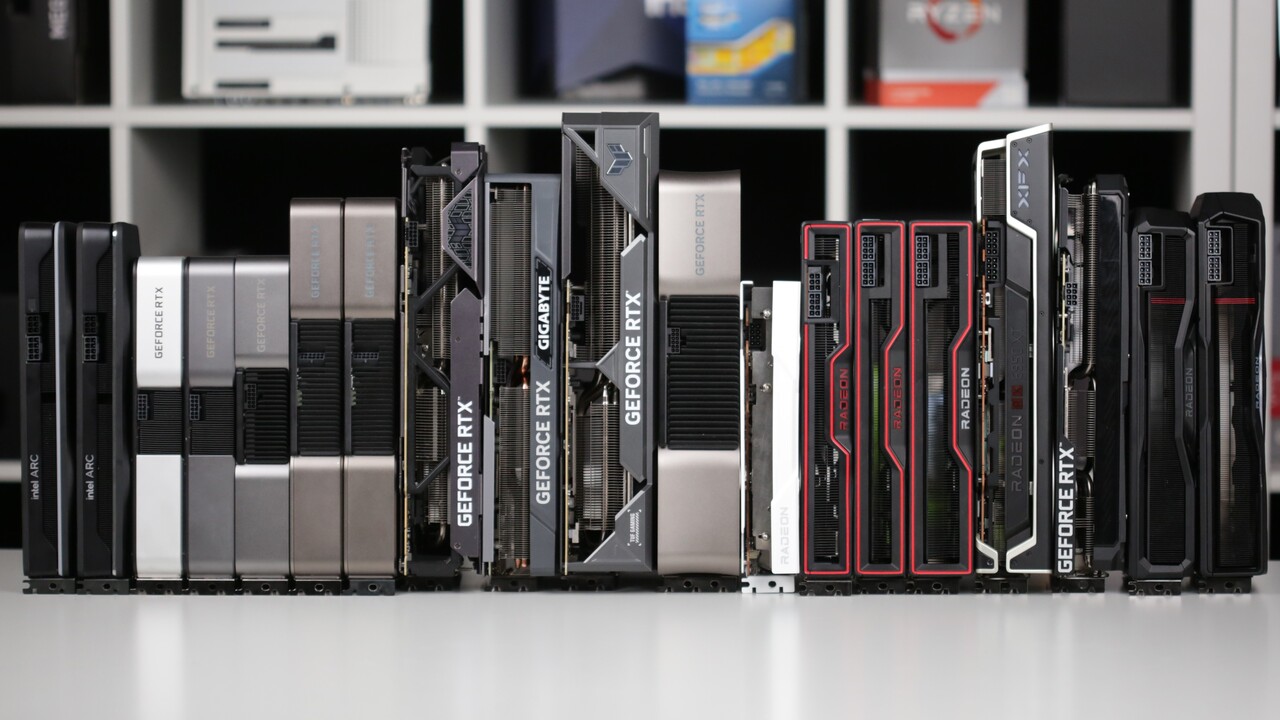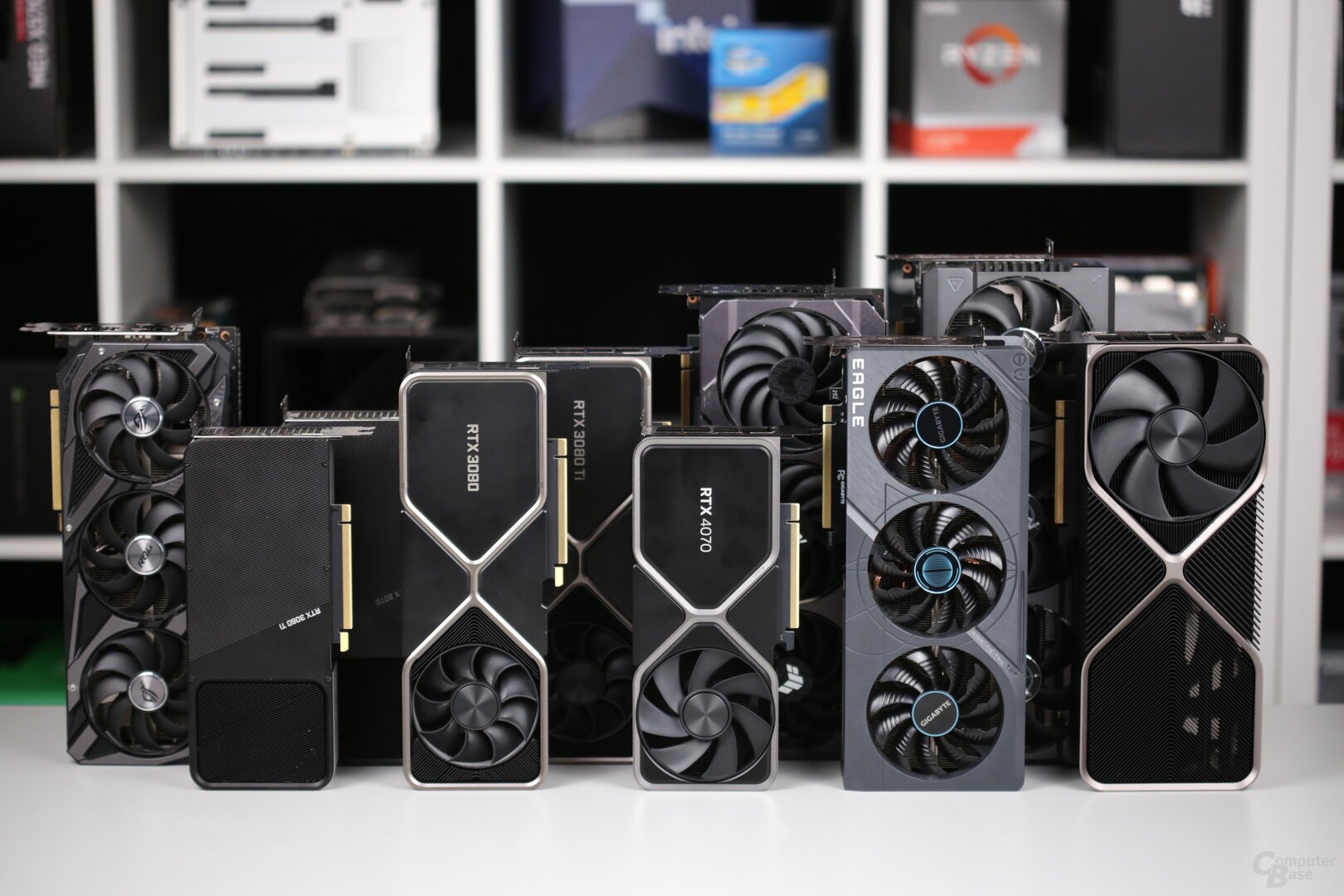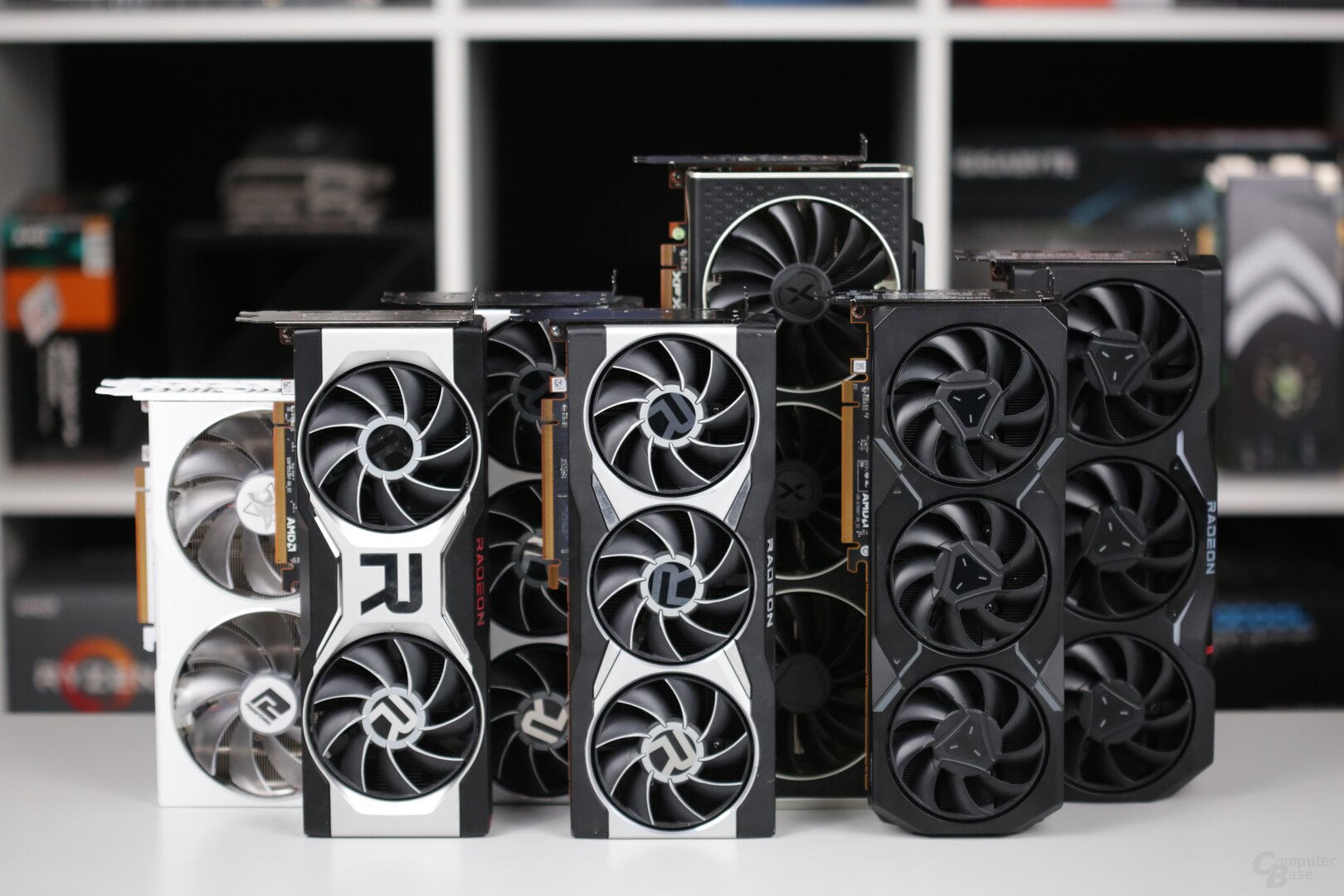Graphics card ranking 2024: GPU comparison with GeForce RTX, Radeon RX & Arc for April

The buyer's guide ranking clarifies which graphics card from AMD, Nvidia or Intel you should buy based on tests and benchmarks. The best GeForce, Radeon and Arc gaming models in the entry-level, mid-range and high-end classes (from Full HD to UHD) are recommended. These are the recommendations for April 2024.
This article was originally published in German: Grafikkarten-Rangliste 2024: GPU-Vergleich mit GeForce RTX, Radeon RX & Arc für April.
Why should you trust this buying advice?
The web is full of buying guides, so why should you trust this one? We have been working on this for almost ten years with great care and many tests, with one clear goal: to advise buyers honestly!
It is not lovelessly put online (by an AI) to satisfy unsuspecting Google users with supposed buying advice, although it is really only about the quick sales commission. It is regularly updated to always include the latest prices and products.
The basis for the performance comparison rankings are the countless graphics card tests and benchmarks that ComputerBase has been carrying out on an almost weekly basis for over 20 years.
In addition, the large community in the subforum Graphics cards: buying advice is available around the clock to provide help and advice.
Which gaming graphics card should I buy?
The answer to this question depends primarily on the resolution in which you want to play. Full HD (1.920 × 1.080), WQHD (2.560 × 1.440) and Ultra HD (3.840 × 2.160) are essential. Another decisive factor is which games are played. The answer also depends on whether the games are played with classic rasterizer or modern raytracing graphics. Depending on this, our recommendations are as follows.
This buying guide from us is based on modern AAA titles. If you play older games or games with lower demands on graphics details, you can of course still be happy with weaker graphics cards.
| Without raytracing | |||
|---|---|---|---|
| 1.920 × 1.080 Full HD |
2.560 × 1.440 WQHD |
3.840 × 2.160 Ultra HD |
|
| Recommended with restrictions from | GeForce RTX 3060 GeForce RTX 4060 Radeon RX 6600 Radeon RX 7600 Arc A750 |
GeForce RTX 3080 GeForce RTX 4060 Ti 16 GB Radeon RX 6700 XT |
GeForce RTX 3080 Ti GeForce RTX 4070 Ti Radeon RX 6950 XT |
| Unrestrictedly recommended from | GeForce RTX 3080 GeForce RTX 4060 Ti 16 GB Radeon RX 6700 XT Radeon RX 7700 XT |
GeForce RTX 3080 Ti GeForce RTX 4070 Radeon RX 6800 XT Radeon RX 7800 XT |
GeForce RTX 4070 Ti Super Radeon RX 7900 XT |
| With raytracing | |||
| Recommended with restrictions from | GeForce RTX 3060 Ti GeForce RTX 4060 Ti Radeon RX 7600 XT Arc A770 |
GeForce RTX 3080 Ti GeForce RTX 4070 Radeon RX 6950 XT |
GeForce RTX 3090 GeForce RTX 4070 Ti Super Radeon RX 7900 XTX |
| Unrestrictedly recommended from | GeForce RTX 3080 GeForce RTX 4070 Radeon RX 6800 XT Radeon RX 7800 XT |
GeForce RTX 3090 GeForce RTX 4070 Ti Super Radeon RX 7900 XT |
GeForce RTX 4080 |
Recommendations for Full HD
Graphics cards with 8 GB are no longer enough for modern games - especially if you don't want to have the VRAM load displayed nervously for every new title in the future. As a result, and in view of the recent significant increase in gaming requirements, many relatively fast graphics cards can be found for just 1.920 × 1.080. The computing power is not necessarily required, but the memory expansion is, at least for carefree gaming.

Recommendations for WQHD
In WQHD, the demands on the graphics card increase; both the computing power and the available VRAM must be greater than for Full HD. However, the required leap in performance is still limited: 2.560 × 1.440 is no longer a particularly high resolution for modern hardware. However, if you want to make intensive use of raytracing, you still need a fairly fast graphics card for WQHD. At AMD in particular, only the fastest Radeon accelerators are often sufficient - unless the detail level is reduced.
Recommendations for Ultra HD
3.840 × 2.160 places the highest demands on the graphics card in several respects; both computing power and memory must be sufficient. Accordingly, some games require the fastest 3D accelerators, while other titles are somewhat more moderate in their requirements. The graphics card cannot be fast enough, especially with raytracing.
In UHD, DLSS or FSR is now often mandatory - and also useful
Gaming in Ultra HD: what does that even mean in 2024? A few years ago, the question did not arise: it was rendered "natively" in 3.840 × 2.160. However, temporal upsampling such as AMD FSR or Nvidia DLSS has now become so good that it either matches or sometimes even surpasses the image quality of native Ultra HD despite the lower render resolution.
In Ultra HD with DLSS, FSR or XeSS at the "Quality" level, which corresponds to a render resolution of 2.560 × 1.440, a better image quality is often achieved with massively increased performance than with native resolution. It therefore often no longer makes sense to play with the classic native resolution, especially as there are already games that no longer allow rendering without upsampling.
At lower resolutions, however, the quality decreases and the strengths and weaknesses of the two technologies become more apparent. While FSR often achieves usable to good results in Ultra HD, DLSS clearly wins in WQHD and especially Full HD. In Full HD in particular, it is much more likely that the native picture quality is no longer achieved. This does not make the technologies, especially DLSS, pointless with fewer render pixels, but the quality is usually no longer on a par with native rendering, especially with FSR. Nevertheless, upsampling is still often the preferred tool when more FPS is required because lower presets cost even more image quality.
DLSS/FSR Super Resolution, Frame Generation, Ray Reconstruction - what?
However, DLSS and FSR cannot simply be switched on and off. There are various quality levels and now also different techniques in general, but they all run under the same name. Super Resolution, Frame Generation and Ray Reconstruction are all bundled under DLSS, but are fundamentally different techniques. And DLSS is also available in countless versions - from DLSS 2 to DLSS 3 and DLSS 3.5 through to various sub-versions.
Even if AMD FSR is a little clearer than Nvidia's technology: apart from technology enthusiasts, nobody really understands which term stands for what and what should be used in which situation. In order to simplify this, ComputerBase has written an FAQ (so far only in German), which deals with the topic and is updated on an ongoing basis.

Current graphics card offers from well-known stores
You can buy PC hardware in what feels like hundreds of stores on the Internet. You can try to achieve the lowest purchase costs with various price machines. However, if you want to buy a graphics card as easily as possible, you can simply use the following table, which leads you to the desired model at the well-known retailers Alternate, Amazon, Caseking and Mindfactory. Alternatively, you can search for the cheapest offer yourself in the ComputerBase price comparison.
Current graphics card benchmarks
The following graphics card comparison shows the performance of all graphics cards recently tested by ComputerBase with the same test system in Full HD (1.920 × 1.080), WQHD (2.560 × 1.440) and Ultra HD (3.840 × 2.160) resolutions. The test system is based on an AMD Ryzen 9 7950X3D and the rest of the hardware is also state of the art.
Notes and tips on the diagrams
The grouped diagrams in the leaderboard, which show the three different resolutions, can be switched via the tabs in the diagram header. The benchmarks are divided into performance ratings with and without raytracing. If you do not want certain games to be included in the average analysis, you can set this using the "Bearbeiten" button. By clicking on "+ XX Einträge", further tested graphics cards can be displayed. If a graphics card is clicked on in the ranking, it receives the performance index of 100 percent and all other test subjects in the same diagram are displayed with their relative speed. This makes it easy for everyone to see what performance gains a faster model actually brings.
- AVG-FPS: This is how many frames per second are calculated on average in the 25-second test sequence. The AVG FPS (AVG = average) does not say anything about whether the game hangs in between, possibly only between individual rendered frames.
Benchmarks in games with and without raytracing
The first benchmark gallery contains the benchmark results of classic rasterizer games, i.e. without an active raytracing option. The available resolutions are 1.920 × 1.080 (Full HD), 2.560 × 1.440 (WQHD) and 3.840 × 2.160 (Ultra HD).
However, some games now offer raytracing to improve the graphics to a greater or lesser extent. As raytracing enables more realistic graphics and the technology is supported by current AMD, Intel and Nvidia graphics cards as well as the Sony PlayStation 5 and Microsoft Xbox Series X and Series S consoles, it is being used in more and more titles. However, raytracing sometimes costs a lot of speed and it also changes the order of the GPUs in the graphics card benchmarks.
Price-performance ratio of the graphics cards
The following diagrams show the FPS-per-euro ratio of the graphics cards, illustrated for the three resolutions Full HD, WQHD and Ultra HD, each with and without raytracing. There is more to the performance of a graphics card than the FPS, which is important to bear in mind.
The diagrams can be used as follows: If a specific graphics card (point in the diagram) is selected, a line appears showing the price-FPS ratio of the other graphics cards in relation to the selection made. Graphics cards that lie in the area of the green arrow have a better price-to-FPS ratio. Those placed in the red area of the arrow have a worse one. The colors of the dots stand for the manufacturer (green for Nvidia, red for AMD, blue for Intel) and have nothing to do with a better or worse price-FPS ratio.
What is the price trend for graphics cards?
The market prices of desktop graphics cards are constantly changing, whether due to product launches, new competitor models or simply because of sudden events such as a chip shortage or a mining boom. The following table shows the price development of all current graphics cards.
| RRP | Best price (in stock) 09.11.2023 |
Best price (in stock) 06.02.2024 |
Best price (in stock) 04.03.2024 |
Best price (in stock) 04.04.2024 |
|
|---|---|---|---|---|---|
| RX 6600 | 339 € | 199 € (12) | 210 € (13) | 208 € (13) | 210 € (12) |
| RX 6800 | 579 € | 449 € (4) | 412 € (5) | 378 € (4) | 387 € (3) |
| RX 7600 | 299 € | 272 € (14) | 277 € (13) | 278 € (13) | 278 € (13) |
| RX 7600 XT | 359 € | – | 353 € (10) | 355 € (10) | 349 € (10) |
| RX 7700 XT | 459 € | 459 € (12) | 454 € (13) | 429 € (14) | 419 € (14) |
| RX 7800 XT | 549 € | 539 € (15) | 529 € (14) | 524 € (18) | 519 € (19) |
| RX 7900 GRE | 609 € | – | – | 564 € (8) | 564 € (12) |
| RX 7900 XT | 1.050 € | 835 € (16) | 769 € (14) | 744 € (16) | 729 € (14) |
| RX 7900 XTX | 1.149 € | 989 € (14) | 978 € (11) | 949 € (12) | 949 € (10) |
| RTX 3060 | 329 € | 289 € (33) | 289 € (22) | 287 € (24) | 287 € (21) |
| RTX 4060 | 329 € | 305 € (33) | 299 € (36) | 295 € (38) | 295 € (39) |
| RTX 4060 Ti | 439 € | 409 € (38) | 384 € (40) | 399 € (42) | 379 € (41) |
| RTX 4070 | 609 € | 579 € (48) | 573 € (58) | 559 € (56) | 539 € (56) |
| RTX 4070 Super | 659 € | – | 639 € (31) | 619 € (40) | 599 € (46) |
| RTX 4070 Ti | 899 € | 829 € (52) | 772 € (55) | 729 € (52) | 729 € (46) |
| RTX 4070 Ti Super | 889 € | – | 873 € (30) | 849 € (48) | 839 € (39) |
| RTX 4080 | 1.329 € | 1.179 € (47) | 1.149 € (39) | 1.060 € (37) | 1.029 € (29) |
| RTX 4080 Super | 1.109 € | – | 1.109 € (16) | 1.109 € (23) | 1.079 € (39) |
| RTX 4090 | 1.799 € | 1.879 € (33) | 1.849 € (40) | 1.789 € (41) | 1.749 € (36) |
| Arc A750 | 349 € | 213 € (5) | 219 € (5) | 220 € (5) | 220 € (5) |
| Arc A770 | 419 € | 349 € (5) | 335 € (4) | 339 € (4) | 324 € (4) |
What will happen in the next few weeks
The Radeon RX 7900 GRE finally made it onto the retail market in February, which means that the market is likely to be at low ebb for some time to come. There are currently no indications of new graphics cards - nothing will happen at all before the second half of the year. There are also no plans for new products in the foreseeable future. Only the fact that AMD is currently working on FSR 3.1 with an improved super-resolution algorithm has been announced. However, there is nothing more than a "later in the year" release date.
Which GPU for current games?
ComputerBase regularly takes a close look at which GPU delivers which performance in which current games. Currently, most of the titles can also be found in the test course, but over time the overlaps will become less frequent - until a new course is created.
Tests for Dragon's Dogma 2, Horizon Forbidden West and more
Technical tests (so far only in German) have been published in recent months for Dragon's Dogma 2, Horizon Forbidden West and many more.
- Cities: Skylines II
- Dragon's Dogma 2
- Forza Motorsport
- Horizon Forbidden West
- Lords of the Fallen
- Skull & Bones
- The Talos Principle II

Graphics card warranty: Which manufacturer offers which warranty?
It is quite rare, but from time to time the graphics card at home can sometimes break down. If the hardware has a defect, you have to rely on the manufacturer's warranty. And this varies greatly, sometimes even between individual models.
Details of the manufacturer's warranty
It is not easy to get a precise overview of the situation. Even the manufacturers sometimes find it difficult to provide the exact warranty conditions for each country. An exact overview of the current warranty situation in Germany can be found for a total of 18 manufacturers in the ComputerBase forum. The list is maintained by the community itself.
Further recommendations for the gaming PC
A graphics card alone is not enough for a modern PC. Processor, mainboard, memory and other components are just as necessary as they are important. The forum (mainly in German) offers help in putting together complete computers: Here, readers work on constantly updated posts that clarify what the optimum PC, including a suitable processor and all the trimmings, looks like for a particular budget.
The compilation for the ideal gaming PC leads the way. It lists six basic configurations from 450 to 1,400 euros. Many of the CPUs mentioned above can be found there directly.
- The ideal gaming PC: assemble your own gaming PC
- The ideal Mini-ITX gaming PC
- The ideal office PC
- And many more reader articles on the topic
ComputerBase has updated the ranking list about the current price and delivery situation, which now corresponds to the status as of April 4, 2024. Recently published gaming technology tests by us have been linked and the section on the warranty for graphics cards has also been updated.
Change history
| Date | Customization | New GPUs compared |
|---|---|---|
| April 04, 2024 | Prices and delivery situation updated, new game tests, warranty section renewed | - |
| March 04, 2024 | Prices and delivery situation updated, new game tests | Radeon RX 7900 GRE |
| February 06, 2024 | Restructuring of the buying guide, prices and delivery situation updated, general recommendations adjusted, new game tests | GeForce RTX 4070 Super, RTX 4070 Ti Super, RTX 4080 Super, Radeon RX 7600 XT |
| November 09, 2023 | Prices and delivery situation updated, new game tests, inclusion of older graphics card benchmarks | - |
| September 08, 2023 | Prices and delivery situation updated, general recommendations adjusted, new game tests, various small things | Radeon RX 7700 XT, Radeon RX 7800 XT |
| July 01, 2023 | Prices and delivery situation updated, general recommendations adjusted, new game test | GeForce RTX 4060 |
| June 01, 2023 | Complete retread of the buying guide | GeForce RTX 4060 Ti, Radeon RX 7600 |
| March 02, 2023 | Prices and delivery situation updated, feature list expanded, new game tests | - |
| February 06, 2023 | Prices and delivery situation updated, new game tests, new section on notebook graphics cards | RTX 4000 Laptop GPUs |
| January 10, 2023 | Prices and delivery situation updated, general recommendations adjusted | Radeon RX 7900 XTX, RX 7900 XT, GeForce RTX 4070 Ti |
| November 28, 2022 | Prices and delivery situation updated, new game tests, general recommendations adjusted, adjustments for next-gen graphics cards | GeForce RTX 4090, RTX 4080, Intel Arc A770, A750 |
| September 09, 2022 | Prices and delivery situation updated, new game test | - |
| August 05, 2022 | Prices and delivery situation updated, new game test | - |
| July 01, 2022 | Prices and delivery situation updated, new game tests | - |
| June 09, 2022 | Prices and delivery situation updated, FSR 2.0 integrated | Radeon RX 6650 XT, RX 6750 XT, RX 6950 XT |
| May 02, 2022 | Prices and delivery situation updated | - |
| April 13, 2022 | Prices and delivery situation updated, new game tests | GeForce RTX 3090 Ti |
| March 09, 2022 | Prices and delivery situation updated, new game tests | - |
| February 14, 2022 | Adaptation to new test course 2022, prices and delivery situation updated, new game tests | Radeon RX 6600 GeForce RTX 3050 |
| November 25, 2021 | Prices and delivery situation updated, new game tests | - |
| August 23, 2021 | Prices and delivery situation updated, new game tests | Radeon RX 6600 |
| September 03, 2021 | Prices and delivery situation updated, new game test | - |
| August 13, 2021 | Prices and delivery situation updated, new outlook, new game test | Radeon RX 6600 XT |
| July 02, 2021 | Prices and delivery situation updated, AMD FSR installed, new game test | - |
| June 11, 2021 | Prices and delivery situation updated, new outlook | GeForce RTX 3080 Ti GeForce RTX 3070 Ti |
| April 9, 2021 | Prices and delivery situation updated, new game test, new outlook | Radeon RX 6700 XT |
(*) Bei den mit Sternchen markierten Links handelt es sich um Affiliate-Links. Im Fall einer Bestellung über einen solchen Link wird ComputerBase am Verkaufserlös beteiligt, ohne dass der Preis für den Kunden steigt.
Dieser Artikel war interessant, hilfreich oder beides? Die Redaktion freut sich über jede Unterstützung durch ComputerBase Pro und deaktivierte Werbeblocker. Mehr zum Thema Anzeigen auf ComputerBase.
